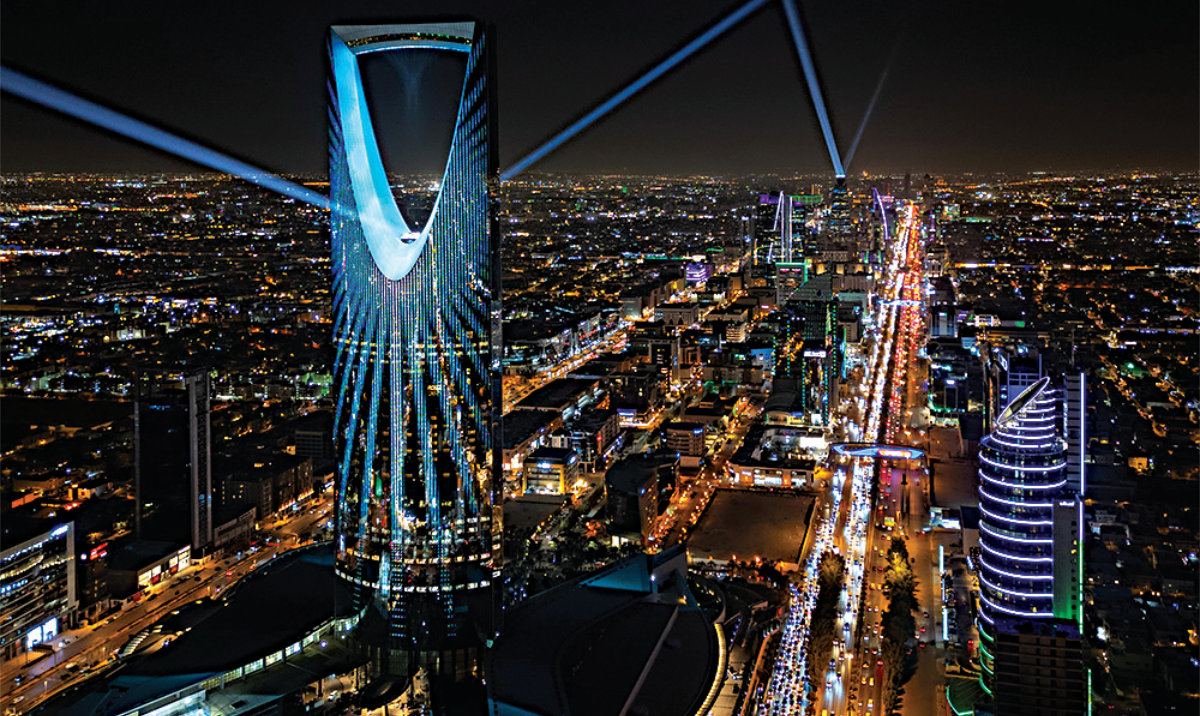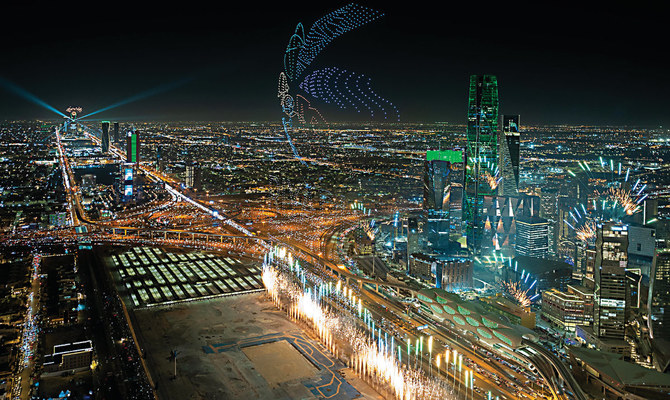RIYADH: Saudi Arabia’s successful bid for Expo 2030 is going to provide an economic boost to the Kingdom that lasts far beyond the event itself, according to a new report.
Research by Al-Rajhi Capital shows that while travel, tourism, and hospitality are set to be the big winners from a SR355 billion ($94.64 billion) boost to Riyadh’s economy, the real estate, banking, and insurance sectors are also set to benefit.
Expo 2030 is forecast to deliver a 0.75 percent annualized impact over the next 25 years, and is expected to accelerate the implementation of government-led giga-projects and have a domino effect on the travel, tourism and hospitality sectors.
The pre-Expo phase is poised to benefit several industries closely linked to the event, including construction, whereas the during and post-event periods will see growth in insurance, hospitality, and primary healthcare, as well as car rentals, aviation, food and beverages, telecom, and advertising.
Riyadh emerged victorious in the bid to host the 2030 World Expo after securing 119 votes from the 182 members of the Paris-based Bureau International des Expositions.
Scheduled to open on Oct. 1, 2030, and conclude on Mar. 31, 2031, the proposed site in north Riyadh – located near King Khalid International Airport – spans 6 million sq. meters, with more than half of that dedicated to exhibition space.
The event is poised to feature 246 participants, including country pavilions, international organizations, and non-official participants. The Saudi government has allocated a budget of $7.8 billion for the Expo, signaling a significant investment in this global showcase of progress and collaboration.
In anticipation of the Expo 2030, non-oil gross domestic product growth for 2030 is forecasted at 4 percent, building on today’s base.
Tourism
One sector set to see the most visible benefit from Expo 2030 is tourism.
The industry plays a key role in Saudi Arabia’s economic diversification strategy known as Vision 2030, which involves the Kingdom boosting non-oil related sectors.
Saudi Arabia is already seeking to massively increase hotel capacity, with 315,000 additional hotel rooms set to be built by the end of this decade, according to a Knight Frank report released in April.
However, the analysis by Al-Rajhi Capital shows that Riyadh will need an extra 100,000 rooms in addition to that figure in order to cope with the anticipated visitor numbers to Expo 2030.

As the Saudi capital currently has between 20,000 and 25,000 rooms, this requirement for new lodgings creates significant opportunities for local contractors and suppliers, contributing to both immediate economic activity and long-term growth in the Saudi construction industry. The sector is expected to grow at a compounded annual growth rate of 5.7 percent, reaching $79 billion by 2030, excluding construction related to Expo 2030.
Leisure tourism is forecasted to see an 18.1 percent compounded annual growth rate, with aspirations to attract 39.7 million visitors by 2030.
Helping this is the establishment of Riyadh Air, a new airline set to commence operations in 2025 which will bolster connectivity and tourism infrastructure, the report added.
Financial and insurance sectors
Al Rajhi Capital underscored the significant impact of Expo 2030 preparations on diverse sectors in Saudi Arabia, with increased financial demands boosting activity.
The insurance and consulting sectors are experiencing a surge in demand for services related to risk assessment and strategic advisory support during the pre-Expo phase.
During the event itself, the insurance sector will see a rise in demand for comprehensive coverage; hospitality and hotels will experience increased activity for accommodation services; car rentals and aviation will thrive due to transportation needs; and the food and beverage sector will also prosper.
Emphasizing the crucial role of the banking sector, the report said that Expo 2030 is also expected to drive significant growth in corporate loans, with spending related to the event projected to grow at a compounded annual growth rate of 11 percent to reach $824 billion by 2030.
In the property and casualty insurance sector, heightened demand during Riyadh Expo 2030 is anticipated, potentially adding SR675 million to the market.

Expo 2030 is expected to drive significant growth in corporate loans, with spending related to the event projected to grow at a compounded annual growth rate of 11 percent to reach $824 billion by 2030.
Mazen Al-Sudairi, head of research at Al Rajhi Bank
This comes alongside an expected SR646 million from the travel insurance industry.
Emphasizing the crucial role of the banking sector, the report said that Expo 2030 is also expected to drive significant growth in corporate loans, with spending related to Expo projected to grow at a compounded annual growth rate of 11 percent to reach $824 billion by 2030.
In an interview with Arab News, Mazen Al-Sudairi, head of research at Al Rajhi Bank, noted there has been a substantial growth in Saudi lending, doubling over the past 15 years, primarily driven by government spending.
He emphasized the emergence of new growth drivers, such as the Public Investment Fund, the private sector, and foreign direct investment, collectively poised to support Saudi economic growth.
In response to the question about the anticipated growth of deposits to align with the increasing asset side represented by loans, he said: “Usually in Saudi Arabia lending is funded with deposits, which is about 80 to 90 percent of loans.”
Al-Sudairi added: “With issuing new financial products, it might decline to 70 percent. We’ve got to have other tools, maybe bonds, and sukuk to fund banks. Deposits will also grow with the massive monetary size or the money supply of the economy.”
Jobs
Al-Sudairi believes Riyadh will see a surge in job creation similar to that experienced by Dubai, the host city of the COVID-19-delayed Expo 2020.
An EY report indicated 4 million jobs were created by the event, and Al-Sudairi expressed confidence that Expo 2030 would help support Vision 2030’s 7 percent unemployment rate target as the labor force expands.
FASTFACTS
• Research by Al-Rajhi Capital shows that while travel, tourism, and hospitality are set to be the big winners from a SR355 billion ($94.64 billion) boost to Riyadh’s economy, the real estate, banking, and insurance sectors are also set to benefit.
• Expo 2030 is forecast to deliver a 0.75 percent annualized impact over the next 25 years, and is expected to accelerate the implementation of government-led giga-projects and have a domino effect on the travel, tourism and hospitality sectors.
He added that the impact of the Riyadh event on the jobs market would become clearer gradually from 2024 onwards.
Beyond Expo 2030
The report also considered growth areas in the Saudi economy away from Expo 2030.
The Kingdom’s growing role as a global player in the international sport scene was flagged up, with initiatives such as Aramco’s International Cricket Council title sponsorship and the proposed NEOM winter sports complex set to boost revenues in this sector.
The Kingdom’s bid for the FIFA World Cup 2034 and its hosting of events like the eSports World Cup and Asian Indoor & Martial Arts Games also exemplify its commitment to leveraging sports as a driver for economic development.
The report added that Saudi Arabia’s giga-projects, valued at $1.25 trillion under the Vision 2030 Initiative, encompass vast real estate development plans.
With plans for 5.3 million sq. meters dedicated to retail spaces and 6 million sq. meters for office spaces, these projects underline the Kingdom’s commitment to economic diversification.




















